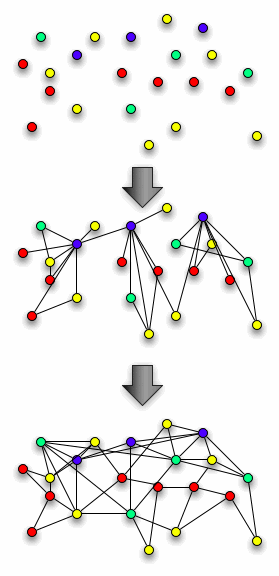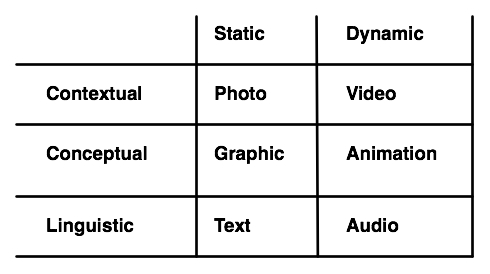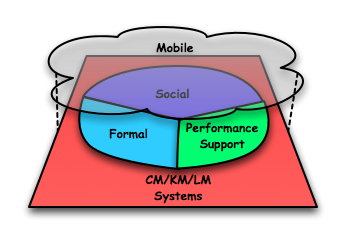After my last blog post, a commenter asked a pertinent question:
Many organizations/companies have multiple intranets, wiki sites, and so forth, often making it difficult for employees to know where to go when they want an answer or more information. Let‘s say you are the Director of a company‘s Education/Training department and you want to move more toward information learning. While your department creates online and classroom courses on how to use the company‘s main products, you see the need for more advanced-level training. As the Director, you want to harness the knowledge within and have the experts bring their conversations to a wiki site. You want to provide a platform for this knowledge to be shared, discussed, and build upon. Your vision is that once the wiki site is up for awhile, your instructional designers can take some of the knowledge that‘s posted and create a job aid, reference document, and so forth that could be distributed more formally.
Do you move forward with yet another wiki site and not worry about all of the other internal wiki sites, intranet, and so forth?
In general, I don’t like site proliferation, at least of one sort. I hear it all the time: I ask “are you using portals?” and the reply is “oh, yeah, we’ve got hundreds”. Hundreds? How does anyone know where to go for what? And BTW, I’m treating wikis and portals somewhat interchangably here, as wikis can be portals, but portals are another way of users providing resources to each other, and I see technology support for communities of practice to include both the capabilities of collaborative editing of resources (wikis) and storing other relevant materials (portals). I use portal as the overarching term as well (also including discussion forums, blogs, profiles…).
The problem isn’t really the number, however, it’s how they’re being organized. Typically, each business unit is providing a portal of their information for others to use. The problem with this is, it’s organized by the producer’s way of viewing the world, not the consumer’s. Bad usability. Which is usually confounded by only one way of organizing, a lack of ways of reorganizing, and sometimes not even a search capability! (Though fortunately that’s now being baked into most tools.)
So people wonder where to go, different units create different mythologies about what portals are useful, some sites aren’t used, others are misused, it’s a mess.
On the other hand, I do want users to seize control and create their own sites, and there are reasons for groups to create sites. If you have hundreds of user communities, you should have hundreds of portals. The real organizational principle, however, should be how the users think about it. There are two ways to handle that: you can do good usability, with ethnographic and participatory methods of finding out how the users think about the world, or better yet, let the inmates run the asylum (and provide support, back to the facilitation message).
For formal information – HR, product sheets, pricing, all the stuff that’s created – it should be organized into portals by role: who needs this different information. You can use web services to pull together custom, user-centered portals on top of all this information. And, then, you should also empower communities of practice to create their own portals as well.
So, to answer the question, I think it’s fabulous to create a site where experts can put up information, and the learning unit can mine that for things they can add value to. However, do it in conjunction with the experts and users. Let their self-organization rule who plays and how the playground is structured, don’t dictate it from above.
I saw an example of that in a recent engagement, where a group offering software training couldn’t keep up with the changes in the software, so they started putting it up on a wiki, and now they’re devolving control to the user experts. It’s just coping, but it’s also strategic. Tap into the knowledge of your groups.
I laud the questioner for the desire to find a way to broaden responsibility and empower the users. Do it anyway, do it right, but then also start evangelizing the benefits of ensuring that the other proliferation of wikis, portals, etc, are also user-focused, not department or silo focused, and suggesting portal integration as well as proliferation.
Now, does that make sense? Is your answer to the question different?

 I’ve had a slight blindspot for photos and video because I peg the ‘conceptual’ meter. I recognize the value, though I don’t play with the files enough (tho’ I took a digital audio/video editing course more than a decade ago, and recently edited home videos for my wife’s birthday). Photos and videos are really good for contextualizing, and that’s particularly valuable for examples (and practice).
I’ve had a slight blindspot for photos and video because I peg the ‘conceptual’ meter. I recognize the value, though I don’t play with the files enough (tho’ I took a digital audio/video editing course more than a decade ago, and recently edited home videos for my wife’s birthday). Photos and videos are really good for contextualizing, and that’s particularly valuable for examples (and practice). So I’ve been playing with rethinking my Performance Ecosystem conceptualization and visualization. The original had very discrete components, and an almost linear path, and that doesn’t quite convey the reality of how things are tied together. I believe it’s useful to help people see the components, but it doesn’t capture the goal of an integrated system.
So I’ve been playing with rethinking my Performance Ecosystem conceptualization and visualization. The original had very discrete components, and an almost linear path, and that doesn’t quite convey the reality of how things are tied together. I believe it’s useful to help people see the components, but it doesn’t capture the goal of an integrated system. So here’s my current conception. It took me a long time to create the circle with different components! First I had to discover that there were tools to create freeform shapes, and then work to get them to articulate, but I like the kind of ‘rough’ feel of it (appropriate for it’s stage).
So here’s my current conception. It took me a long time to create the circle with different components! First I had to discover that there were tools to create freeform shapes, and then work to get them to articulate, but I like the kind of ‘rough’ feel of it (appropriate for it’s stage).